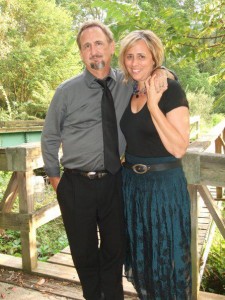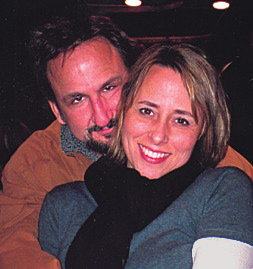Today’s Equally Yoked post is from Karen Beattie, who totally disrupted my schoolwork by sending me a copy of her recently-released book, Rock Bottom Blessings. Holy engrossing book, Batgirl! If Dallas Willard could write a compelling spiritual memoir about a spunky small town girl who struck out for the big city to follow her dream of becoming a writer, and what she learned about God and herself when things didn’t go as planned–well, he still wouldn’t do it as well as Karen Beattie. The book just came out, and you should go buy it Right. Now. Unless, of course, you have schoolwork that needs to get done.
 After years of being single and independent, in 2004 I met David, the man who would become my husband. He wasn’t like any of the other men I dated. He wasn’t evangelical, although we connected spiritually and had the same ideas about faith. And he wasn’t traditional. He had no idea what I meant when I talked about a complementarian vs. egalitarian marriage.
After years of being single and independent, in 2004 I met David, the man who would become my husband. He wasn’t like any of the other men I dated. He wasn’t evangelical, although we connected spiritually and had the same ideas about faith. And he wasn’t traditional. He had no idea what I meant when I talked about a complementarian vs. egalitarian marriage.
He had lived in Hungary and the Virgin Islands as a newspaper editor and writer, and didn’t seem to have the conventional ideas of marriage. I liked this about him. A traditional, hierarchical marriage scared me. Growing up as a conservative Baptist, I was taught through my church that women were to submit to their husbands. I didn’t exactly know what this meant in practice – but the idea of being in a marriage where men were the “deciders” and the “head” of the household didn’t sit well with me. The thought of it made me feel smothered, trapped, and less than. What if I married someone who wasn’t good at making decisions? Or what if I married someone who didn’t like to take the lead? Would I always be frustrated? And why would God give women certain gifts, if they were not able to fully express them in both marriage and the church? After studying the issue extensively in my 20s, even auditing seminary classes, I came to believe that women should be fully welcomed as equals in both the church and in marriage.
So it was a relief when I met David and he had no idea what I was talking about when I said “complementarian marriage” or talked about submission. When we decided to get married, we discussed what our marriage would be like. We were both on the same page.
So, readers, I married him.
And then something very strange happened.
I had been supporting myself for all of my adult life, but now that I was married, I dreamed of quitting my job. Secretly, all of these years, I realized, I had seen marriage as a way to be released from the prison of my corporate job. Now, I just wanted to be taken care of financially. All of the sudden, a traditional marriage – where the man brought home the bacon and the woman stayed at home – seemed oddly attractive and comforting. I could spend all day writing! I wouldn’t have to deal with corporate politics! If we had children, I could take them to school and bake cookies for them when they came home!
But that’s not what happened. My husband had his own ideas. He wanted to change careers. He was in what seemed to be the moribund field of journalism, and mostly newspapers at that, and had long wanted to go back to graduate school and train to be a psychotherapist. As it turned out, marriage, in part, gave him the support he needed to make this switch.
 We talked about so many things before we got married. We talked about our careers, our expectations, or dreams for our union. But still, there are so many unspoken (and even unconscious) assumptions, that it’s hard to plan how everything will all play out.
We talked about so many things before we got married. We talked about our careers, our expectations, or dreams for our union. But still, there are so many unspoken (and even unconscious) assumptions, that it’s hard to plan how everything will all play out.
A year after we married, David went back to school full-time. I was still working full time. And then, in a series of events that are too complicated for a blog post, but involved a layoff (for me), a crippling recession, and our combined debt – in 2009, a few years after we got married, we found ourselves both jobless and struggle to make ends meet. And because we were trying to build our family through adoption – our adoption plans were put on hold indefinitely.
During that season of unemployment, I feared our marriage would fall apart.
As the recession, my unemployment, his schooling, and our money troubles went on, I started resenting David. I thought it was his responsibility to get us out of this mess.
What I didn’t realize was that I had lingering, deep-seated expectations of marriage that were anything but egalitarian. Whether it was because I had grown up listening to too many sermons on marriage, or because I had observed my parent’s marriage, which was a typical one for their generation (mom was a housewife most of my childhood, dad was the breadwinner), I’m not sure.
But one day it occurred to me that I couldn’t have it both ways. I can’t have an egalitarian marriage, without also accepting the responsibility for what that means. It means that I can’t just abdicate my responsibility for the financial health of our family. I can’t just shove the burden of making tough decisions onto my husband. And I can’t blame him for life not turning out the way we had expected, or that we don’t have the amount of money in our bank account that I wish we had.
With all of the mutuality of our marriage, comes the mutual responsibility of taking care of one another. Now, years later, we are digging out of the debt that we accumulated when we were unemployed, we both have decent jobs, and we have a 3-year-old foster daughter. Life is not perfect, but my ideas of marriage have grown and stretched and expanded. In some ways, I feel that egalitarian vs. complementarian discussion is too narrow and profane.
Marriage isn’t a set of “roles,” it’s a relationship between two people. Each marriage is different and unique. David and I both bring strengths and weaknesses to our marriage, and after eight years, we are starting to learn how to fit them together like pieces of a puzzle.
Right now, that means I’m making a bit more money than my husband, but he’s in a career that is making a difference in people’s lives, and I’m glad I can contribute more financially so he can do something he is so good at. It also means that he has more flexibility to pick up our foster daughter from daycare, and to be a “househusband” on days when he doesn’t see clients. We make decisions together and each take the spiritual lead at different times.
 The Catechism of the Catholic Church defines the Sacraments as “efficacious signs of grace, instituted by Christ and entrusted to the Church, by which divine life is dispensed to us.” But I heard my friend Terry, the director of adult spiritual formation at my church, say that small “s” sacraments happen all the time – whenever something or someone is a mediator of grace. Marriage is a Sacrament. And in our marriages we are mediators of grace to our spouses through all of the small ways we love and forgive each other, when we cast aside pre-assumed roles and let each other grow into the people we were created to be. I think of that now as David and I continue to fit together the puzzle pieces of our marriage, to form a picture that is beautiful and whole.
The Catechism of the Catholic Church defines the Sacraments as “efficacious signs of grace, instituted by Christ and entrusted to the Church, by which divine life is dispensed to us.” But I heard my friend Terry, the director of adult spiritual formation at my church, say that small “s” sacraments happen all the time – whenever something or someone is a mediator of grace. Marriage is a Sacrament. And in our marriages we are mediators of grace to our spouses through all of the small ways we love and forgive each other, when we cast aside pre-assumed roles and let each other grow into the people we were created to be. I think of that now as David and I continue to fit together the puzzle pieces of our marriage, to form a picture that is beautiful and whole.
Karen Beattie is writer who lives in Chicago with her husband and 3-year-old foster daughter. She is the author of Rock-Bottom Blessings: Discovering God’s Abundance When All Seems Lost, which was recently published by Loyola Press, and from which this blog post is adapted.
Next week’s Equally Yoked post is from Aaron Armstrong. No, not the reformed blogger Aaron Armstrong (although I’m sure he’s a very nice guy), MY Aaron Armstrong, who surprised me by writing this beautiful post last week, and totally made me cry. 🙂
Want to contribute to the Equally Yoked series? Email Jenny at jennyraearmstrong@gmail.com.
Leave a comment for a chance to win Families Where Grace is In Place by Jeff Vonderven. Winner announced March 1st!

7 Responses to Karen Beattie and David McCracken: “We Are Mediators of Grace to our Spouses”